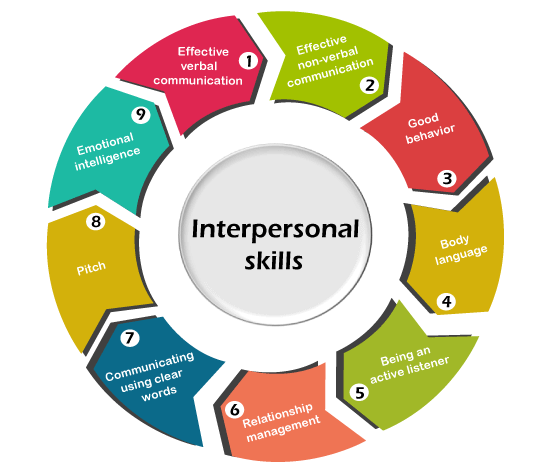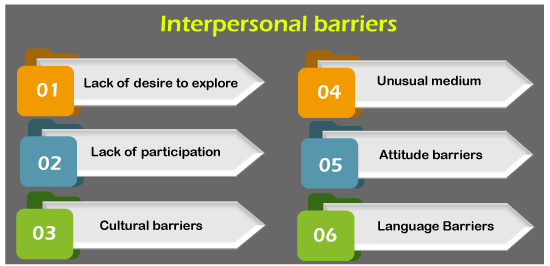Interpersonal SkillsInterpersonal is created from two words, 'Inter' and 'personal,' which means communicating with each other. Interpersonal skills are the skills required for effective interpersonal communication. The communication can be online, face-to-face, video conference on mobile, etc. We can communicate using any communication, such as verbal, non-verbal, written, and visual. 
It explains the strategy and behavior of a person to interact nicely with others.These skills are not only bounded to our professional workspace but also help to maintain personal relations. Interpersonal skills are essential, whether we are a manager, employee, or looking for work. Such skills are also known as soft skills that determine how well a person can communicate, behave, and relate to others. Importance of interpersonal skillsInterpersonal skills are essential to maintain a healthy relationship with people in the workspace. It not only maintains positivity but also creates a comfortable environment for us to work. A person with excellent interpersonal skills might be able to:
We can quickly improve our interpersonal communication skills. An organization or company always seeks candidates that can work collaboratively with others. It helps us to work effectively with other members of different teams. For example, A project can be completed quickly with a group of members who work together to achieve a goal rather than a single member. Interpersonal IntelligenceInterpersonal intelligence is defined as the ability to communicate effectively with others. Verbal, non-verbal and other forms of communication play a vital role in achieving effective interpersonal communication. Interpersonal intelligence can be quickly developed as compared to general intelligence. It also defines a person's ability to quickly catch people's moods, feelings, intentions, and motivation. Such persons can easily understand and influence the actions and opinions of other people. Interpersonal SkillsAt work or on a family occasion, we must communicate and interact with many people, such as suppliers, buyers, project departments, managers, teams, colleagues, and relatives. A weak interaction can create a negative impression and might spoil our relations. Hence, interpersonal skills are essential to learn and develop. 
Let's discuss some of the most common interpersonal skills, which are listed below: Effective verbal communicationEffective verbal communication encompasses good relations at the workspace and home. There are two aspects of effective verbal communication; 'what to say,' and another is 'how to say.' People with good interpersonal intelligence are also intelligent at verbal communication. They can easily ask some questions or express the information with confidence. They also know how to represent their words so that people can easily listen. Effective non-verbal communicationNon-verbal communication is not only about moving our body but also about our facial expressions. For example, Dance Dance is a form of art where facial expression enhances it. Our body movements will not define it as a complete form of art. People with good verbal communication skills can easily control their body language and spoken words. Good BehaviorBehavior represents human relations. It is defined as the strategy in which people communicate with each other. It includes both verbal and non-verbal cues for effective communication. Unusual behavior can cause distractions. Body languageBody language is the essential interpersonal skills that use non-verbal aspects of communication. Two persons represent different body language for a similar task. We always give some unspoken signals during our conversation with others. Sometimes we are aware, while sometimes not. It includes postures, eye movement, hand movements, facial expressions, voice tone, etc. For example, moving our legs during the conversation shows the disinterest of a person in that conversation. Being an active listenerListening includes providing responses and reactions to the other person during a conversation, termed as feedback. Feedback to the speaker makes communication a more active process. It can be in any form, such as verbal or non-verbal. Relationship ManagementThe relationships are the two-way stream. We must be emotionally intelligent to understand the relationships and their importance. We are required to set the boundaries to maintain a healthy relationship. Communicate using clear wordsWe might not represent our views clearly while using unusual words. The language and words we use should be clear and precise. Picking hard words from the dictionary and inserting in our presentation does not mean that we are good at communication. We need first to develop communication using simple words. Speaking even with simple words can create a good impression. PitchPitch is defined as the frequency at which the vocal cord of the humans vibrates. The pitch determines how we represent our words in a practical, attractive, and easy to understand manner. For example, a low pitch might not be audible to everyone, while a very high pitch may disturb. Hence, pitch maintenance is an essential part of effective interpersonal communication. Emotional intelligenceEmotional intelligence or EQ is the ability to control our own and other emotions. Other factors, such as empathy, motivation, social skills, and self-awareness, also describe emotional intelligence. Studies have shown that people with high EQ generally have better job performance, better mental health, and good relationships with others. Emotional awareness also helps us to understand better the people communicating with us. Interpersonal barriersInterpersonal barriers are present outside the individual and affect communication around us. It may occur when any candidate lack sensitivity, confidence, etc. 
So, let's discuss the interpersonal barriers of communication in detail.
How to develop Interpersonal skills?Interpersonal skills are easy to learn and develop. Let's discuss the method to develop and improve our interpersonal communication skills.
Next TopicMeans of Communication
|
 For Videos Join Our Youtube Channel: Join Now
For Videos Join Our Youtube Channel: Join Now
Feedback
- Send your Feedback to [email protected]
Help Others, Please Share









